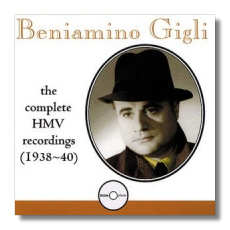
The Internet's Premier Classical Music Source
Related Links
- Latest Reviews
- More Reviews
-
By Composer
-
Collections
DVD & Blu-ray
Books
Concert Reviews
Articles/Interviews
Software
Audio
Search Amazon
Recommended Links
Site News
 CD Review
CD Review
Beniamino Gigli

The Complete HMV Recordings (1938-1940)
Beniamino Gigli, tenor
Various accompaniments
Romophone 82023-2 ADD monaural 77:14
By 1938, Beniamino Gigli was a mature tenor and in his prime, and although there were other tenors who sang with more taste, restraint, and appropriateness of style, there were few who had a greater God-given voice. Gigli's singing touched the man in the street first and the connoisseur second, and when a new record of his came on the market, there was almost always someone on the block who would get it, even if he had never even been to a live opera. This collection of 23 tracks, ranging from Italian popular songs to arias from Don Giovanni, accurately represents him, even if it covers a period of only 26 months.
In September 1938, Gigli was free to sing more or less where he wished to sing. As if to foreshadow the war to come, he recorded two of the most popular German lieder for HMV that month – Schubert's Serenade and Brahms' Lullaby. He also recorded Bixio's Desiderio in both Italian and German. He then spent the latter part of that year and the first part of 1939 in the United States, culminating with performances at the Metropolitan Opera. He returned to Europe and participated in three separate HMV recording sessions in the summer months. Then Germany invaded Poland, World War Two started, and Gigli, as an Italian citizen, was limited to appearances and recordings in that country and in Germany. The last tracks on this CD are from recording sessions that took place in January and November 1940. Between September 1938 and November 1940, Gigli also participated in complete recordings of Verdi's Requiem, Puccini's Madama Butterfly, and Mascagni's Cavalleria Rusticana, and these are readily available on other discs.
With his scooping between notes and easy access to sentimentality, Gigli's Schubert Serenade – in German, nevertheless – could hardly be less authentic, and his recordings of Caccini's Amarilli and Don Ottavio's two arias are innocent of anything resembling historically informed performance practice, yet even these recordings work as examples of how beautiful the human voice can be. Where Gigli is really in his element is in material such as Tosti's Aprile and Donaudy's O del mio amato ben (both irresistibly passionate) and in "Io conosco un giardino," an aria from Pietri's Maristella that evokes an almost erotic response from the tenor… and, by extension, from his audience.
For solidly operatic pleasures, this disc contains emotionally generous renditions of "Amor ti vieta" from Fedora and "Che avvien?… No! Pazzo son" from Manon Lescaut. Gigli, even though he was a star tenor, could be quite a good colleague in the recording studios as on the operatic stage, and this disc includes his partnership with Maria Caniglia in two duets from La traviata, and playing son to Cloe Elmo in "Ai nostri monti" from Il trovatore. This too is music that suited Gigli perfectly (even if he took liberties here as well), and the vehement "Di quella pira" (disappointingly, without chorus) that concludes the CD pretty much sums up how exciting and free-wheeling this tenor could be.
The transfers and audio restoration are by Mark Obert-Thorn, and the results are neither annoyingly noisy nor excessively filtered; the voice comes forward strongly without any gimmickry or distortion. Alan Blyth's long booklet note offers welcome historical and vocal insights. This is a welcome addition to Romophone's growing chronological series of Gigli discs.
Copyright © 2002, Raymond Tuttle


















